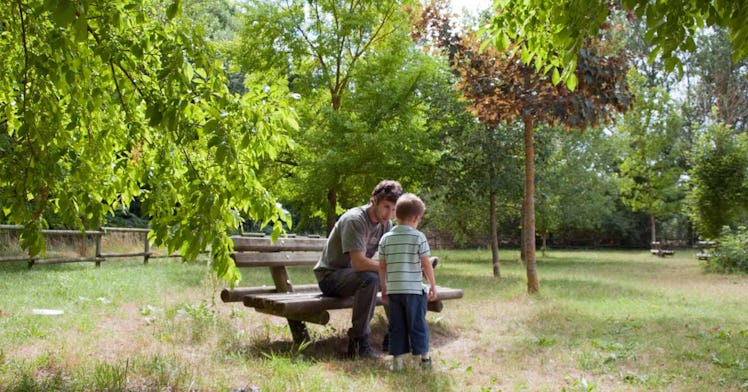Why Parents Should Let Their Children Fail More Often
Sometimes, the best way to help a child who is struggling is to stand beside them with unconditional love and let them fail according to psychologist Dr. Kevin Leman.

Starting around toddlerhood parents will begin negotiating the fine line between helping a child too much and helping them too little. Nobody wants to see their kid hurting. But keeping them from hurt may also keep them from progressing and learning. Which means it’s super easy for parents to feel deeply conflicted — wanting to make the world easy for a child while hoping they can build resilience.
For psychologist Dr. Kevin Leman, author of When Your Kid Is Hurting: Helping Your Child through the Tough Days, the answer to balance is simple: a child can deal with most struggles, as long as parents are completely behind them. How does that work? With a hefty dose of folksy wisdom thrown in, Leman told Fatherly that parents must offer as much love as possible and step in only when it’s necessary. Because when kids feel powerful enough, the can solve problems themselves. It’s all about, healthy distance, bottomless love, and a hefty dose of parental humility.
Do parents really need to solve a child’s problems when they’re struggling?
Parents are rather clueless today in so many ways. They mean well. But it’s a natural inclination, especially for us dads. Because dads are fixers. But if you do that, you’re preparing them for a world that doesn’t exist. When you go in and do what a kid should be doing for themselves you’re taking your kids’ self-esteem. Your chipping away at a fundamental building block of your kids’ personality. At some point, the kid internalizes that until they believe someone else needs to solve their problems.
So we need to let our kids fail?
Failure is important in life. It isn’t a bad thing. It’s a good thing, and anyone who is successful will tell you so.
But what about those really tough days? Isn’t a parent obligated to give some kind of comfort?
The tough days are there. There’s no mistake. And your first inclination is to fix it. But most of the things we say to kids are dead wrong, like: “Oh, honey, it will be okay.” Really? Or “Oh, honey, that’s no big thing,” which diffuses a kid’s feelings. Almost everything that naturally comes out of a kid’s mouth is not a helpful thing to say when the kid is hurting.
So, then, what does help when a kid is upset?
We’re the psychological blankie. When kids are hurting, we have to be sympathetic to their hurt. You need to come across to kids with humility and then look at the problem together. This leads to a dialogue and an understanding that the parent knows what the kid is up against. And that relieves stress in a kid’s life.
So that idea of humility … That makes it sound like it’s important for parents to manage their own behavior too.
Kids are always watching and they’re taking emotional behavioral and spiritual notes on how you live your life. They know how to push your buttons. They know how to get you angry. They watch how you treat other people. Kids are very much into fairness. And, let’s face it, sometimes dads pull the trigger way too quick. We make a poor judgment and say something that might be inappropriate or harmful. But you will never look bigger in your kid’s eyes if you say, “I’m sorry. Will you forgive me?”
But there’s got to be a time when parents do step in and help. When is it appropriate?
Bullying. When your kid is being bullied, that’s one on the times to step in. Pound on administrator’s doors. When your kid’s physical safety is at risk, you have to do something and step forward.
What is the one essential lesson you want parents to really understand about helping kids with rough days?
I always say if you see a turtle on a fence post you know he didn’t get there by himself. A parent has to understand that they are the best teacher for their child. They have to communicate that you have your kids back. That flat-out, unqualified “I love you” is crucial. But you can’t live their life for them. You have to stay in the bullpen. And staying in the bullpen is the hard part.
Like, parents can’t be a reliever. They can’t be the closer.
Right. They have to know you’ll take a bullet for them. But you’re not going to do their homework for them. You’re not going to lie for them. There are things they have to do for themselves.
And what are the consequences then, if you are the kind of parent that helps with homework?
If you bring a kid up to believe they’re the center of the universe where is there room for almighty God in their life? They become so egocentric and inflated with self-importance, they don’t learn the gift of helping other people and giving to other people.
So what about parents who feel like they’ve already ruined their kids because they’ve been relief pitching for them for so long?
It’s never too late. You never stop being a parent. You start your conversation with your kid with an apology. You tell them you didn’t pay attention. Because these relationships can become strained to the point where there isn’t contact. Humble yourself, ask for forgiveness and try to move on.
This article was originally published on